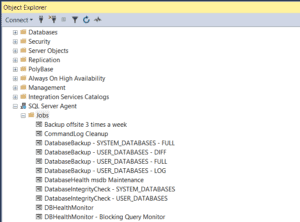SQL Agent Jobs

What Are SQL Agent Jobs?
If you’ve been managing a SQL Server environment for any amount of time, chances are you’ve come across SQL Server Agent Jobs. But what exactly are they, and why are they so critical to efficient database management?
In this blog post, I’ll break down what SQL Agent Jobs are, how they work, and why they’re a key tool in any DBA’s toolkit.
Understanding SQL Server Agent Jobs
At its core, an SQL Agent Job is a scheduled task that runs within SQL Server. These jobs are managed by the SQL Server Agent, a component that automates routine tasks like backups, index maintenance, and running queries. Essentially, SQL Agent Jobs are the “set it and forget it” feature of SQL Server, helping DBAs automate repetitive processes and maintain database health.
Key Components of SQL Agent Jobs
An Agent Job consists of several key components:
- Steps – Each job is broken down into one or more steps. A step could be executing a T-SQL script, running a maintenance plan, performing a backup, or even running a PowerShell script. Each step can have different actions and be tied to specific success or failure conditions.
- Schedules – This defines when a job runs. Jobs can be set to run at specific intervals (e.g., daily, weekly, or monthly), or triggered based on certain conditions, such as database activity. You can also run jobs manually.
- Alerts – Alerts notify you when certain conditions are met. For example, if a job fails or runs longer than expected, SQL Server Agent can send you an email or a message in the event log.
- Operators – Operators are the DBAs or system administrators who are notified when something goes wrong. Operators are typically tied to alerts, making it easier to stay informed about the status of your jobs.

Why Agent Jobs Are Important
SQL Server Agent Jobs are a critical part of SQL Server automation, helping DBAs streamline operations and improve efficiency. Some key use cases include:
1. Automating Backups
Regular database backups are essential to avoid data loss. SQL Agent Jobs make it easy to automate full, differential, and transaction log backups, ensuring your data is safe.
2. Index Maintenance
Over time, database indexes can become fragmented, which impacts performance. You can use SQL Agent Jobs to schedule regular index defragmentation or rebuild tasks.
3. Monitoring and Reporting
SQL Agent Jobs can be used to run monitoring scripts, gather performance statistics, or create regular reports on database health.
4. Handling Batch Processes
For applications that require batch processing—such as running nightly reports, data imports, or data cleansing—SQL Agent Jobs can execute these tasks automatically at off-peak hours.
5. Automating Data Cleanup
SQL Server Agent Jobs can help automate the cleanup of old or unused data, keeping your database size under control and improving performance.
Creating and Managing SQL Server Agent Jobs
Creating a SQL Agent Job is straightforward. Here’s a quick overview of the process:
- Open SQL Server Management Studio (SSMS).
- Expand the SQL Server Agent node, then right-click on Jobs and select New Job.
- Give your job a name and navigate through the tabs to define steps, schedules, alerts, and operators.
- Once you’ve configured the job, click OK and your job is ready to go.
You can monitor the status of your SQL Agent Jobs in SSMS under the SQL Server Agent node, where you can view job history, edit jobs, or troubleshoot issues with failed jobs.
Best Practices for SQL Server Agent Jobs
To get the most out of SQL Agent Jobs, here are a few best practices:
- Monitor Job Failures – Always set up alerts and notifications for failed jobs, especially for critical processes like backups or maintenance tasks. This ensures you’re aware of any issues as soon as they happen.
- Test Your Jobs – Before scheduling a job to run regularly, make sure to test it manually. You want to ensure it runs correctly without errors, especially for tasks that involve backups or data changes.
- Keep Job Steps Simple – When possible, break larger tasks into smaller, simpler steps. This makes troubleshooting easier if a job fails, as you can isolate the step that caused the failure.
- Document Your Jobs – Document the purpose and configuration of each job, especially if you’re part of a larger team. This helps others understand the jobs you’ve set up and why they’re in place.
- Set Up Operator Notifications – Always assign operators to critical jobs so you receive alerts in case something goes wrong. It’s better to know right away rather than finding out hours later.
Conclusion
Agent Jobs are an essential tool for automating database tasks, streamlining operations, and improving the reliability of your SQL Server environment. From automating backups to handling batch processes and maintenance tasks, these jobs can save time and reduce the risk of human error.
If your SQL Server environment doesn’t currently leverage SQL Agent Jobs—or if you feel that your jobs aren’t optimized—Stedman Solutions can help! We offer SQL Server Managed Services to ensure that your jobs are configured properly and running efficiently. Contact us to learn how we can optimize your SQL Server environment.
Stay tuned for more tips on how to get the most out of your SQL Server!
Want to learn more about TSQL programming and SQL Server?
Take a look at our SQL Server courses available at Stedmans SQL School.

Leave a Reply